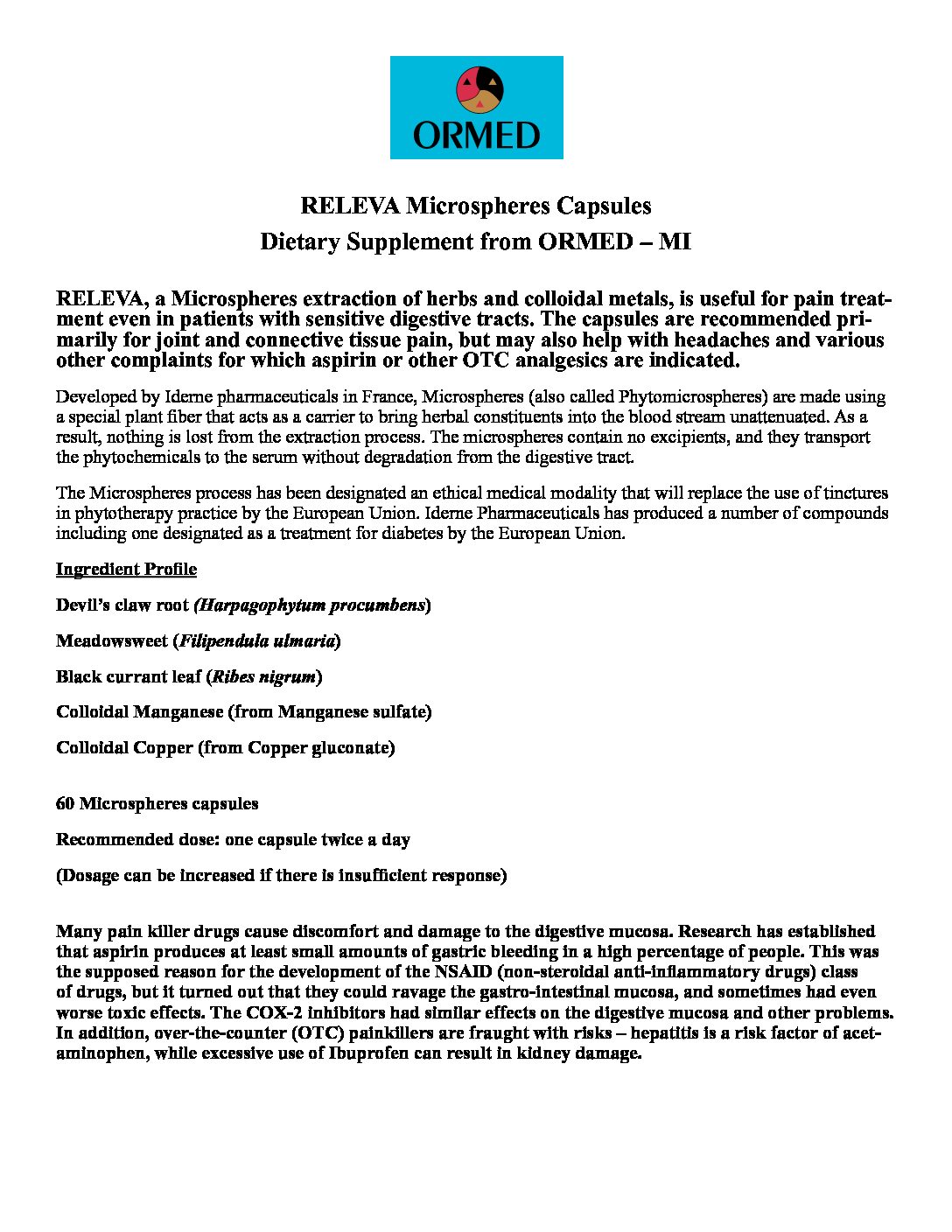Releva 60 caps
RELEVA, a Microspheres extraction of herbs and colloidal metals, is useful for pain treatment even in patients with sensitive digestive tracts. The capsules are recommended primarily for joint and connective tissue pain, but may also help with headaches and various other complaints for which aspirin or other OTC analgesics are indicated.
Developed by Iderne pharmaceuticals in France, Microspheres (also called Phytomicrospheres) are made using a special plant fiber that acts as a carrier to bring herbal constituents into the blood stream unattenuated. As a result, nothing is lost from the extraction process. The microspheres contain no excipients, and they transport the phytochemicals to the serum without degradation from the digestive tract.
The Microspheres process has been designated an ethical medical modality that will replace the use of tinctures in phytotherapy practice by the European Union. Iderne Pharmaceuticals has produced a number of compounds including one designated as a treatment for diabetes by the European Union.
Ingredient Profile
Devil’s claw root (Harpagophytum procumbens)
Meadowsweet (Filipendula ulmaria)
Black currant leaf (Ribes nigrum)
Colloidal Manganese (from Manganese sulfate)
Colloidal Copper (from Copper gluconate)
60 Microspheres capsules
Recommended dose: one capsule twice a day
(Dosage can be increased if there is insufficient response)
Many pain killer drugs cause discomfort and damage to the digestive mucosa. Research has established that aspirin produces at least small amounts of gastric bleeding in a high percentage of people. This was the supposed reason for the development of the NSAID (non-steroidal anti-inflammatory drugs) class of drugs, but it turned out that they could ravage the gastro-intestinal mucosa, and sometimes had even worse toxic effects. The COX-2 inhibitors had similar effects on the digestive mucosa and other problems.
In addition, over-the-counter (OTC) painkillers are fraught with risks – hepatitis is a risk factor of acetaminophen, while excessive use of Ibuprofen can result in kidney damage.
Devil’s Claw (Harpagophytum procumbens)
Harpagophytum is used as an anti-inflammatory in rheumatic disorders esp. in diabetic patients and those with cardiac abnormalities; and for tendinitis, sprains, and arthritis. It is an analgesic for joint disease, back pain and
headache. It also is a mild COX-2 inhibitor, inhibits TXB2 release; and has antioxidant activity, clears free radicals and suppresses enhanced production of metalloproteinases by inhibiting pro-inflammatory cytokines.
Meadowsweet (Filipendula ulmaria)
Various parts of this plant have been used medicinally for centuries, primarily for relief of pain and fever. Other uses have included relief of gastrointestinal complaints, including peptic ulceration and diarrhea. Its anti-inflammatory effects can be accounted for by the fact that all parts of the plant contain several salicylate compounds, including salicylic acid itself. In 1897, when Felix Hoffmann produced acetylsalicylic acid, he used salicin produced from meadowsweet plants. This led to the development of the brand name Aspirin, which was derived from the botanical name at the time for meadowsweet, Spiraea ulmaria.
Because of the high levels of salicylates, preparations containing meadowsweet extracts are contraindicated in patients taking warfarin or other anticoagulants, and also in those already taking NSAIDs. Extracts of the plant
have been known to cause bronchospasm, therefore caution is advised in its use by asthma sufferers.
Black Currant leaf (Ribes nigrum)
Widely used in Europe for a variety of indications, Black currant extract has been studied for its effects on reducing inflammation, but not damaging cartilage or other connective tissue. One study examined the effect
of black currant leaves on different prodelphinidins, on the proteoglycans (PGs), type II collagen (coll. II) and prostaglandin E(2) (PGE(2)) production by differentiated human chondrocytes cultivated in long term (12 days)
and in clusters as well as their inhibition potential on COX-1 and COX-2 in vitro.
Colloidal Manganese
Most people in the U.S. have heard about the use of colloidal silver for infections. Many practitioners of French phytoaromatherapy use a variety of other colloidal metals to stimulate coenzyme activity of various biochemical
reactions. Oligotherapy, the therapeutic use of microdoses of these electrolytically activated metals, was developed more than 100 years ago by Dr. Jacques Ménétrier, who discovered an anti-allergic effect from microscopic amounts of manganese.
Colloidal Copper
French phytoaromatherapy doctors attribute the legendary benefit of copper bracelets for arthritis sufferers to the anti-inflammatory properties of colloidal copper. Dr. Ménétrier used a combination of manganese and copper colloidal metals for what he called the “arthrotuberculous diathesis,” a constitutional type of patient prone to arthritis and inflammatory rheumatism.
CONTRAINDICATIONS AND PRECAUTIONS: Pregnancy, biliary lithiasis, bronchial asthma, gastric irritation, nausea, diarrhea, use of anti-coagulants, anti-arrhythmics, anti-diabetic medications, sensitivity to
salicylates, nephritis, hemorrhagic disorders;
NOTES: Avoid in patients with enuresis, on anti-coagulants, before surgery, or with hematuria.
The information presented on this web site has not been approved by the Food and Drug Administration or any other government agency. The contents are meant only to acquaint the reader with natural therapies available in the field of German Biological Medicine. Patients should not use the remedies or therapies presented in this web site without first consulting a licensed health care practitioner.






